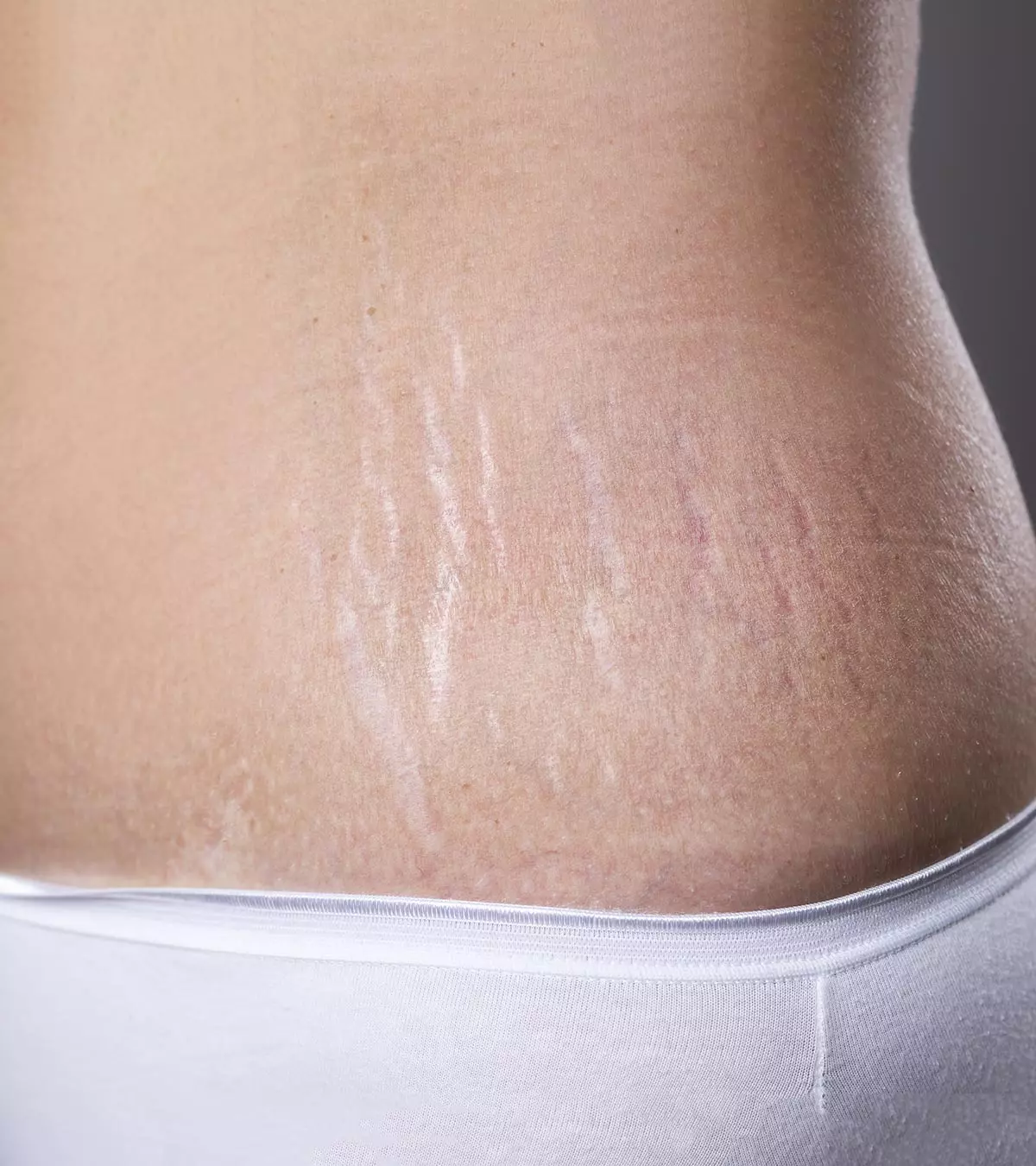
Image: Shutterstock
The additional weight gained during pregnancy could be a concern to some. However, a few natural home remedies for weight loss after delivery could relieve it. Women retain about 6.6lb weight a year after delivery. Sometimes, this weight may get carried forward to the next pregnancy. Also, a report by the American College of Obstetricians and Gynecologists states that nearly 65% of women of reproductive age are either overweight or obese. It puts them at risk of developing chronic obesity during pregnancy or postpartum weight retention (1) (2). Read on to know more about the importance of losing weight after pregnancy, the ideal time to start weight loss procedures, and a few tips to lose weight.

Key Pointers
- Retaining postpartum body weight increases risk of obesity, cardiovascular disorders, arthritis, and postpartum depression
- Experts recommend waiting until breastmilk supply is normal and the baby is about two months old before trying for weight loss
- Gradual weight loss is desirable through healthy, balanced diet, managing cravings, mindful eating, and physical activities
- Avoid skipping meals and fad diets as they may negatively impact postpartum recovery and breastmilk supply.
Importance Of Losing Excess Weight After Delivery
In a study utilizing data from the Canadian Community Health Survey (CCHS), it was found that a considerable number of Canadian women, constituting to 32% of the surveyed population (n=1,335,615), experienced excessive weight gain during their pregnancies. Losing weight after pregnancy is essential due to the following reasons (3) (4) (5).
- Postpartum weight retention might be a major contributor to obesity. Obesity, in the long run, can increase the risk of other illnesses such as hypertension and diabetes.
- There might even be a higher risk of lifestyle-related health complications such as cardiovascular diseases.
- Excessive weight places undue pressure on joints, thus increasing the risk of joint problems such as arthritis.
- Some studies indicate that gestational weight gain might increase the risk of postpartum depression; therefore requiring self-care (6).
- Losing weight after pregnancy is good, but you need to know when to start.
What Is The Right Time To Lose Weight After Pregnancy?
The US National Institutes of Health suggests new mothers to wait until the baby is at least two months old and breast milk supply is normalized, before cutting down calories for weight loss (7)
. It is okay to take a year or even more to return to your pre-pregnancy weight. Therefore, there is no need to rush with the weight loss process.
Most postpartum women naturally lose 50% of their pregnancy weight by six weeks after delivery. If you want to add to the weight loss with your efforts, then consult a doctor before beginning any exercise or post partum diet regimen. Weight loss can be unique to each woman and depends on factors like the health of the mother and the baby.
 Point to consider
Point to considerUseful Tips To Lose Weight Postpartum
Weight loss postpartum is a sum of healthy eating, an active lifestyle, and continued breastfeeding (if you are a breastfeeding mother) (7). The US Centers for Disease Control and Prevention also suggests that weight loss should be gradual and steady rather than quick (8). It means, it is okay to take time to lose weight slowly rather than focussing on rapid weight loss.
The following tips and suggestions might help you shed weight after your pregnancy.
1. Pick food from various groups

Nutritional adequacy can be achieved during breastfeeding by including calorie-rich food choices in the diet, such as, whole grains, fruits, protein and vegetables. This healthy variety helps attain nourishment along with weight loss (9) (10).
 Point to consider
Point to consider2. Have a mix of nutrients
Two food items may be the same in terms of calorific value but vastly have a different set of nutrients. Focussing on one food group to lose weight could cause you to miss out nutrients you need from other food groups (11). So, do not obsess about calories alone, instead, choose healthy foods (9).
3. Take healthy snacks

Studies suggest that spreading energy intake into four to five small meals a day could have a favorable effect on health (12). Therefore, you may consider having healthy snacks such as unsalted nuts, fresh fruit, yogurt, hummus, or a protein bar.
4. Check portion sizes
Regulate the portion sizes. You can start maintaining a food diary or a food journal app to track your portion sizes. It will help you keep a check on the intake of food in a day (13).
 Quick tip
Quick tip5. Manage cravings
Whenever you crave high-calorie foods, such as chocolate or ice cream, look for their healthy alternatives. For example, you may have dark chocolate with less quantity of sugar than standard milk chocolate. You may pick naturally sweet fruits and vegetables like banana or sweet potato, which can be healthier alternatives.
6. Practice mindful eating

Mindful eating is often referred to as the art of presence while you eat. This approach makes an individual focus all the senses on the food while eating and thus chew the food slow and well (14). Chewing the food well could potentially reduce the total calorie intake, thus supporting weight loss (15).
7. Do not skip meals nor follow a fad diet
Skipping meals or following a fad diet should not be a way for weight loss. It can cause changes in the way your body processes calories, and thus might slow down the weight loss process (16). This is even more important for a breastfeeding mother, as skipping meals might lead to less energy and affect the overall postpartum recovery (9).
 Quick tip
Quick tip8. Stay hydrated

Hydration is essential during lactation and is directly associated with breast milk production (17). Adequate hydration can help in breast milk production, which helps in burning calories.
9. Avoid high-fat, high sugar, and processed foods
Avoid sweetened juices, sugary drinks, and high-fat processed foods. Various studies have observed that too much sugar, fat, and sodium can contribute to weight gain, sabotaging your efforts to lose pregnancy weight (18).
10. Avoid alcohol consumption
A study has concluded that regardless of the type of alcohol consumed, alcohol intake of ≥ 30g/day might contribute directly to weight gain and obesity (19). Since you are likely to breastfeed the baby, it is good to quit alcohol for the benefit of the baby as well.
11. Value homemade food
Homemade food is hygienic and also made from good-quality ingredients. You can also customize the food as per your preference. Eating homemade food could help provide optimum nutrition while also making it easy to eat on time.
12. Eat smart in a restaurant
Some studies show that frequent eating out could lead to possible weight gain (20). It does not mean you should not eat at a restaurant. Instead, follow the same precautions that you would follow at home. Check for the ingredients in a particular dish and avoid foods that are fried, have high sugar or salt, and contain processed ingredients like refined flour. Instead, opt for fresh soups without cornstarch, fresh salads, grilled, baked, and roasted food items.
13. Have an active lifestyle
An active lifestyle is important for sustainable weight loss. It is often confused with exercise; however, both are different. Staying active does not mean exercising, but it means reducing the overall time that you spend sitting or lying.
To stay active, you could try the following things:
- Move around as much as possible and do your work yourself
- Involve yourself in household chores
- Take a walk while talking on the phone instead of sitting
- Whenever allowed, especially after C-section, take stairs instead of the lift
- Take your baby to a quick walk in the stroller
- Go to nearby supermarket on foot
14. Exercise smart
Physical activity accounts for 15-30% of energy expenditure a day (21) Thus, a moderate-intensity exercise session of 30-40 minutes a day for at least five days a week helps you stay healthy. Exercise does not always have to be rigorous and complex. Something as simple as a brisk walk or jogging may suffice (22). You may consider weight training, as well. However, it is best to consult a doctor before beginning any of the postnatal exercises.
15. Breastfeeding
Breastfeeding has been shown to help in postpartum weight loss if the feeding continues for at least six months (23).
16. Sleep and stress
You are bound to have disturbed sleep patterns while looking after a baby. Sleep is essential since chronic partial sleep loss is associated with an increase in the risk of weight gain (24). IInadequate sleep may also affect your eating habits, thus affecting your weight loss goals. Modern societies can lead to high levels of stress, leading to sleep disturbances. One needs to implement stress management programs involving different breathing exercises to reduce weight (25). Try magnesium at night or lavender essential oil at bedtime to improve quality of sleep and restfulness.
Weight loss after childbirth is essential, but it is something that you should achieve gradually. In the next section, we answer a few questions about losing weight after pregnancy.
Frequently Asked Questions
1. Will my body be back to normal after delivery?
Getting back to your pre-pregnancy weight is possible with persistent and patient efforts. Do not follow fad diets but develop a well-balanced meal plan with an active lifestyle.
2. How long does it take to lose weight after having a baby?
It may take six to 12 months (7). But it could differ for each woman and depend on several factors. Do not worry if you take longer than a year to attain your pre-pregnancy weight. Continue to eat healthily and live an active lifestyle.
3. Is it hard to lose weight after C-section?
There is no evidence to prove that C-section could make it difficult for a woman to lose weight. A study found no correlation between C-section delivery and retention of maternal weight (26).
4. Why is my belly still big after delivery?
Some women might look pregnant for a few months after delivery, which is normal (29). It happens when the muscles in your stomach are stretched during pregnancy and may take time to return to their original position. However, if you see your belly sticking out above or below your belly button months after your delivery, it might be a sign of diastasis recti (30). You have to consult your doctor for proper treatment.
5. Can I drink herbal tea after delivery to reduce belly fat?
Many people believe that drinking herbal green tea can reduce belly fat. Some even believe that adding spices or herbs to the tea can offer added benefits. However, there is no scientific backing to this belief. Your doctor or a registered nutritionist can help you take herbal tea in the correct amounts for maximum benefit.
6. Can I chew curry leaves after delivery to reduce belly fat?
Curry leaves have a multitude of benefits. Several studies show that curry leaves have potential antioxidant and anti-diabetic properties. They also have anti-diarrheal and heart-protective effects, among other benefits (31). However, there is no known relationship between having curry leaves and the reduction of belly fat.
7. Why should I have a diet plan after delivery?
A balanced and healthy diet is the best way for a new mother to support herself and her infant (32).
Pregnancy and associated weight gain are entirely normal. It is important to remember that weight loss will occur gradually. Any techniques or plans for rapid weight loss can adversely affect your breastmilk supply and overall health. Set realistic, short-term, and achievable goals. Eat a healthy, well-balanced diet. Engage in mild exercise but only under your doctor’s guidance. Be persistent and consistent with your efforts, and enjoy the process. Do not do anything harsh without an expert’s guidance to lose weight, as it may have adverse outcomes.
Infographic: Home-Based Strategies To Lose Weight After Childbirth
It might take a few months for the new mothers to lose their pregnancy weight. The infographic below outlines effective tips to help you attain your pre-pregnancy weight. However, before following any weight-loss measures, consult your healthcare provider.
Some thing wrong with infographic shortcode. please verify shortcode syntaxIllustration: Simple And Useful Tips For Losing Weight After Pregnancy

Image: Dall·E/MomJunction Design Team
Follow this enlightening video for OB-GYN approved tips and advice to help you in your postpartum weightloss journey.
References
1. Jennifer M. Ohlendorf, Stages of Change in the Trajectory of Postpartum Weight Self-Management; Journal of Obstetric, Gynecologic, & Neonatal Nursing
2. Achieving a Healthy Weight in the Postpartum Patient; ACOG Postpartum Toolkit; American College of Gynecology and Obstetrics
3. Truls Ostbye et al., Predictors of Postpartum Weight Change Among Overweight and Obese Women: Results from the Active Mothers Postpartum Study; National Center For Biotechnology Information (2012)
4. Xavier Pi-Sunyer, The Medical Risks of Obesity; National Center For Biotechnology Information
5. Ulrika Moll et al., Impact of Pregestational Weight and Weight Gain during Pregnancy on Long-Term Risk for Diseases; National Center For Biotechnology Information
6. Fatemeh Dayan et al., The Relationship between Gestational Weight Gain and Postpartum Depression in Normal and Overweight Pregnant Women; Hindawi
7. Losing weight after pregnancy; Medical Encyclopedia; Medline Plus; National Institute of Health; U.S National Library of Medicine
8. Losing Weight; Healthy Weight; Centers For Disease Prevention and Control
9. Losing weight after pregnancy;Medline Plus
10. Jeanne H. Freeland-Graves and Susan Nitzke, Position of the Academy of Nutrition and Dietetics: Total Diet Approach to Healthy Eating; Journal of the Academy of Nutrition and Dietetics
11. Eva V. Osilla and Sandeep Sharma, Calories; National Center of Biotechnology Information
12. Franca Marangoni et al., Snacking in nutrition and health; Taylor & Francis Online
13. Daily Food and Activity Diary; National Institute of Health; U.S Department of Health and Human Services
14. Joseph B. Nelson, Mindful Eating: The Art of Presence While You Eat; American Diabetes Association
15. Zhu Y and Hollis JH, Increasing the number of chews before swallowing reduces meal size in normal-weight, overweight, and obese adults.; National Center of Biotechnology Information
16. Metabolism Myths and Facts; Eatright
17. Goun Jeong et al., Maternal food restrictions during breastfeeding; National Center of Biotechnology Information
18. Holiday A. Durham et al., Comparison of Dietary Intake of Overweight Postpartum Mothers Practicing Breastfeeding or Formula Feeding; National Center of Biotechnology Information
19. Factors That Influence Body Weight, Weight Management: State of the Science and Opportunities for Military Programs.; National Center of Biotechnology Information
20. Naska A et al., Eating out, weight and weight gain. A cross-sectional and prospective analysis in the context of the EPIC-PANACEA study.; National Center of Biotechnology Information
21. Poehlman ET, A review: exercise and its influence on resting energy metabolism in man.; National Center of Biotechnology Information (1989)
22. Physical activity guidelines: How much exercise do you need?; Harvard T.H. Chan School of Public Health
23. Maternal weight-loss patterns during prolonged lactation; The American Journal of Clinical Nutrition
24. Guglielmo Beccutia and Silvana Pannaina, Sleep and obesity; National Center of Biotechnology Information
25. Niovi Xenaki et al., Impact of a stress management program on weight loss, mental health and lifestyle in adults with obesity: a randomized controlled trial; National Center of Biotechnology Information
26. Kandice A. Kapinos et al., Cesarean deliveries and maternal weight retention; National Center of Biotechnology Information
27. Postpartum Weight Loss: When Can You Start Dieting After Pregnancy?; Houston Methodist Hospital
28. Losing weight after birth safely; Pregnancy, Birth and Baby
29. Labor and delivery, postpartum care; Mayo Clinic
30. Diastasis Recti; Cleveland Clinic
31. Dipika Bhusal and Dhirendra Pratap ThakurCurry Leaf: A Review; Reviews In Food And Agriculture.
32. The importance of nutrition in pregnancy and lactation: lifelong consequences; National Library of Medicine
Community Experiences
Join the conversation and become a part of our nurturing community! Share your stories, experiences, and insights to connect with fellow parents.
Read full bio of Dr. Anita Gondy
Read full bio of Swati Patwal
Read full bio of Rebecca Malachi
Read full bio of Aneesha Amonz

















